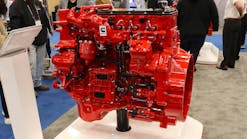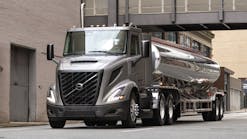WE USED this page in the December 2010 Bulk Transporter to announce that 2011 would be the Year of Tank Truck Driver Sustainability. It is a topic National Tank Truck Carriers has focused on throughout the year and one which will be Job #1 again in 2012. While our industry has not found a silver bullet to the challenge, we do have a lot more ammunition than other trucking sectors to make tank truck driving the truck driver job of choice.
The concept “sustainability” is apropos since it is a term many of our shippers are using in managing their use of natural resources today so that those resources also will be available for others in the future. We must look beyond near term solutions to address a “driver shortage.” Drivers are a natural human resource essential to the safe and efficient distribution of the bulk commodities required for our economy and our way of life. Drivers must be developed and then nourished as much as any stream or the air.
The reasons we do not have enough of the elite tank truck drivers our industry needs to grow, let alone survive, have been well documented and must be addressed. But to cut to the chase, I believe that the key to attracting and retaining drivers is as basic as “show me the money.”
There is a virtual urban legend in the trucking industry that “money is not the most important factor to solving the driver shortage.” If the reader of these words was making essentially the same income today as in the late 1980's for an even more demanding job, where would money be on your list?
Many drivers left the trucking industry during the economic woes of the past few years. They learned that they can make the same or more money as they did in trucking, do it in fewer hours, and be home every night.
It is not unreasonable to project a need for a 30% increase in average truck driver income over the next few years to attract and then retain the drivers we will need. Truck driving is skilled labor that requires at least equitable compensation with other jobs such as those in construction. Tank truck drivers should be the most highly paid truck drivers, but they are not.
The challenges to tank truck driver sustainability are likely to get even greater as two more factors are put into the mix. There is a new suitor for the tank truck driver due to the demand for drivers in the shale gas and oil patches. Tanker companies serving these growing energy regions require drivers now, and they seem to be willing to pay to play. We already are hearing of drivers leaving traditional tank truck jobs for the greener grass promised in this rapidly expanding sector. There is less supply to meet more demand.
Additionally, the productivity of our current driver force, and the driver's income, is likely to be reduced by the Federal Motor Carrier Safety Administration's (FMCSA) final Hours of Service rules we expected by the end of 2011. I do not foresee maintaining the status quo as a viable political option for the agency. A reduction from 11 to 10 hours driving time and elimination of or altering the 34-hour restart will represent a real blow to the flexibility tank truck drivers have to perform their duties.
Obviously, tank truck carrier top management has its job cut out as it works to preserve and replenish the lifeblood of our industry, the drivers. As mentioned above, we will have to do a better job of communicating to our customers that they must become partners in addressing this issue.
The tank truck industry does have clear advantages in competing for the men and women who would like to make a career as a truck driver. We will need to communicate this to potential new drivers and to attract experienced drivers from other industry segments.
Most importantly, the job of tank truck driver is here to stay. It cannot be “outsourced.” Tank truck drivers can count on a more steady employment than in other sectors. Tank truck drivers are regarded as the elite by other drivers, as they should be. The tank truck sector has a turnover rate of less than half of other segments. It is a good place to make a living, but we must make it better.
The tank truck industry is where the technology is and a good fit for a person who is comfortable with structure and playing by the rules. It is a career, not just another driving job. Our drivers do get home more often than those in other segments, some every night. We do not have 53-foot trailers, and there is no need to look for lumpers. We work for quality shippers who increasingly are willing to look at the tank driver as part of the solution to maintaining a successful supply chain, not as a problem. They are learning the value of being the drivers' “shipper of choice.”
The challenge of tank truck driver sustainability and some of the reasons our industry should appeal to drivers were discussed in a recent Bulk Transporter/National Tank Truck Carriers webinar featuring tank truck industry leaders Barbara Windsor from Hahn Transportation, Greg Hodgen from Groendyke Transport, and Steve Rush from Carbon Express. You can access the webinar for free at www.bulktransporter.com.
Conley is president of National Tank Truck Carriers Inc.








